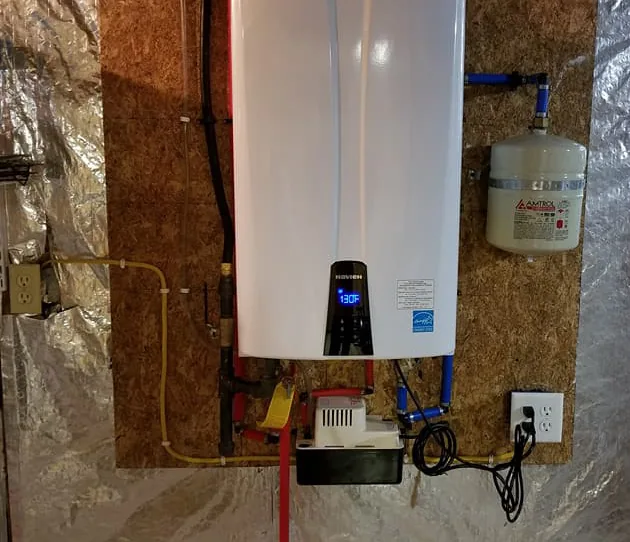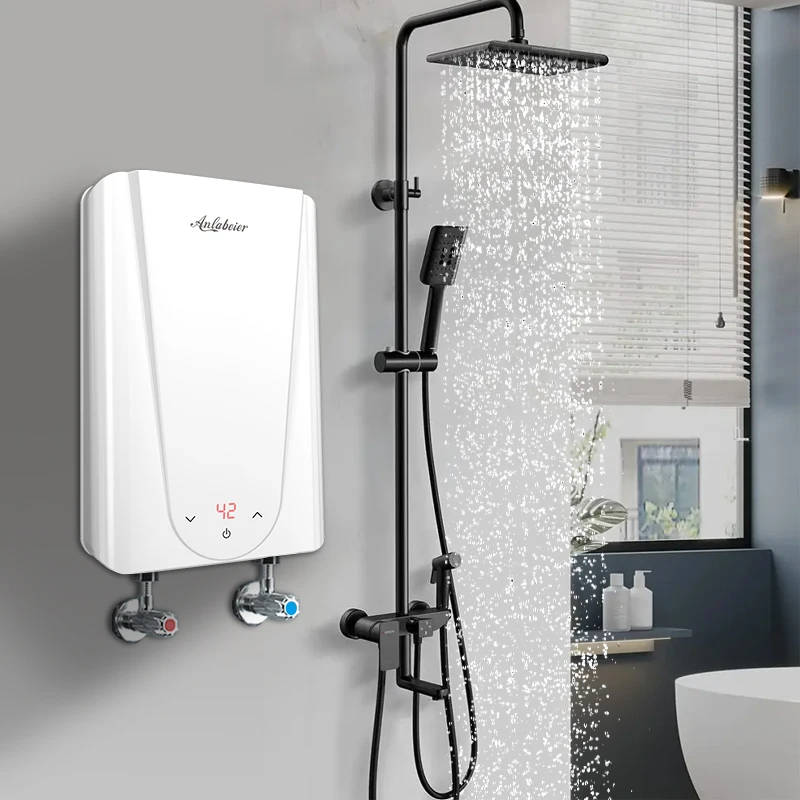Which Tankless Water Heaters Elevate Household Benefits
Which Tankless Water Heaters Elevate Household Benefits
Blog Article
Everybody has got their personal theory about 5 Benefits of Tankless Water Heaters.

In a world where benefit and effectiveness preponderate, it's no surprise that house owners are continuously in search of smarter means to handle their home's power consumption and comfort. One advancement that has gradually obtained appeal is the tankless hot water heater. Yet what exactly makes these systems stand out from the conventional tank-based versions the majority of us matured with? Let's dive in and check out the benefits of tankless hot water heater, assisting you decide if it's time to make the switch in your house.
Introduction
Picture this: you enter the shower after a lengthy day, expecting a soothing waterfall of warm water, only to be welcomed by icy droplets because the last person utilized it all up. Noise familiar? Standard water heaters keep a fixed quantity of warm water, implying you go to the grace of that tank's supply. Tankless systems, on the other hand, heat water on demand. No more running out mid-shower, no more fumbling with schedules just to make certain warm water is available.
Understanding Tankless Water Heaters
What Are Tankless Water Heaters?
Tankless hot water heater, often referred to as on-demand or immediate water heaters, offer hot water just as it's needed. Instead of saving gallons of pre-heated water, these devices kick into action the minute you turn on the tap. Water passes through a warm exchanger, warming up in real-time, suggesting you obtain a nonstop flow of hot water without the need for a huge tank resting lazily by.
Exactly how Do They Differ from Conventional Systems?
Traditional heaters hold a storage tank of warm water, utilizing energy to keep that container at a constant temperature. Tankless units remove the standing supply, minimizing lost energy and the cumbersome footprint of a large cyndrical tube. Essentially, you're upgrading from a "accumulation" mindset to a "made-to-order" strategy.
Common Sorts Of Tankless Systems
Tankless hot water heater normally can be found in 2 ranges: gas and electric. Gas models tend to supply greater flow rates, ideal for larger families, while electric models typically serve smaller sized homes and are commonly easier to set up. In addition, some systems are developed for point-of-use (serving one fixture) while others can handle the whole home's hot water demands.
Key Benefits of Tankless Hot Water Heater
Power Efficiency and Price Savings
Say goodbye to heating a giant storage tank's well worth of water and keeping it toasty all the time. Tankless heating systems lower standby power losses, which can decrease energy costs. While the preliminary expense may be higher, the long-lasting cost savings usually warrant the financial investment.
3. Space-Saving Style
If your home is short on storage, getting rid of the cumbersome storage tank frees up beneficial area. Tankless units are portable and can commonly be installed on walls, tucked away in edges, or set up in limited utility closets without gobbling up the whole space.
4. Longer Life-span
A well-maintained tankless hot water heater can outlast its tank-based relative. Traditional tanks may last 10-15 years, while tankless models can maintain chugging along for 20 years or more, making them a solid financial investment over time.
1. Limitless Hot Water Supply
Ever needed to set up showers so everyone obtains their reasonable share of hot water? With tankless, that becomes a distant memory. As long as the heater's flow capability isn't gone beyond, you can take back-to-back showers without developing into a popsicle.
5. Improved Water Quality
Saving water in a tank can often lead to debris build-up or a somewhat "off" taste. With tankless systems, fresh water is heated instantly, lowering the possibilities of debris accumulation and potentially offering cleaner-tasting water.
Factors to consider Prior To Switching
Though the advantages are engaging, it's a good idea to think about a few elements before totally dedicating.
Evaluating Your Home's Water Use Patterns
If your household at the same time makes use of several fixtures with high warm water need, make certain the unit's flow price meets your demands. Understanding your use patterns aids you choose the right dimension and type of tankless heater.
Maintenance and Care Tips
Tankless systems are reasonably low upkeep, yet they aren't set-it-and-forget-it appliances.
Routine Cleansing and Descaling
Hard water minerals can build up in the heat exchanger, impacting performance. Regular descaling (usually recommended every year) maintains the device running at peak performance.
Yearly Professional Assessments
A yearly checkup from a specialist makes certain small problems are caught early. They'll analyze the system's efficiency, try to find leakages, and assist maintain optimum efficiency.
Preliminary Financial Investment Expenses
Tankless heaters typically feature a greater upfront price tag. In between the unit itself and potential installation alterations, the initial price may give you sticker label shock. But bear in mind to see it as a long-term investment.
Installment Requirements
Relying on your home's infrastructure, you may require added electric capability or gas line upgrades. Guarantee you understand the installment needs and speak with an expert to avoid shocks.
Making Sure Correct Ventilation
For gas designs, correct ventilation is important to securely expel exhaust gases. See to it airing vent systems are tidy and correctly installed to prevent any kind of potential safety and security risks.
Comparing Different Brands and Designs
Not all tankless water heaters are created equal.
Researching Reputable Makers
Search for credible brands with a history of creating quality devices. A trusted maker often supplies far better consumer support and longer guarantees.
Installment: Do It Yourself or Professional?
While some house owners cherish tackling tasks themselves, tankless installment might not be the best time to break out the toolbox.
Benefits and drawbacks of Do It Yourself Installment
A DIY mount could conserve cash, but it includes threats. Incorrect setup can bring about inefficiency or security issues. If you're handy and have experience, it may be viable-- but wage caution.
Reading Reviews and User Comments
User reviews and feedback from neighbors or pals that have actually gone tankless can supply beneficial understandings. Occasionally, real-life experiences can be a lot more telling than marketing sales brochures.
When to Call an Expert Plumbing Technician
For many, calling a pro makes certain whatever's done correctly. A professional plumbing professional understands regional codes, sizing needs, and venting criteria, decreasing the danger of problems.
Making best use of Performance
You have actually bought a tankless unit-- now optimize its efficiency.
Optimum Temperature Level Setups
Lots of people establish their devices in between 120-140 F. Adjusting the temperature can improve convenience and savings. Experiment to find a wonderful area that doesn't squander energy.
Pairing with Low-Flow Fixtures
Want to extend your device's abilities? Take into consideration setting up low-flow showerheads and faucets. They reduce water use, enabling your tankless system to supply a consistent stream of hot water without straining.
Environmental Effect
Tankless water heaters straighten with greener living goals.
Reduced Carbon Impact
By utilizing less energy and only home heating water as required, tankless systems can decrease your home's carbon impact, minimizing your ecological influence.
Preserving Natural Resources
Much less energy consumption and less thrown away warm water convert right into fewer natural resources being made use of, an ecological win-win.
Who Profits A Lot Of from Tankless Heating units?
The charm of tankless heating systems is that they can fit a variety of houses.
Big Families vs. Single Occupants
Large families might like the limitless hot water supply, while single owners value the energy savings from not warming a whole container for simply a single person's morning shower.
Property Owners with Limited Room
If your home is short on square video footage, losing the cumbersome storage tank frees up area for other fundamentals-- or maybe simply much more breathing space.
Eco-Conscious Consumers
Going tankless aligns with eco-friendly values, guaranteeing you're not losing energy or sources.
Future Fads in Tankless Water Heaters
The globe of home appliances is ever-evolving, and tankless water heaters are no exception.
Developments in Innovation
R&D is frequently boosting warm exchangers, making systems much more efficient and durable. Future designs might be also quieter, extra small, and better suited for differing environments.
Smart Home Assimilation
Visualize changing your water heater's temperature level by means of an app or obtaining upkeep notifies on your phone. As clever home technology advancements, we'll see even more connection and benefit.
Final thought
Picking a tankless hot water heater is greater than simply updating your home's warm water system; it's buying long-term convenience, power performance, and a greener way of living. By considering your house's water use, bearing in mind installation needs, and devoting to normal upkeep, you can appreciate a constant stream of warm water without the baggage of a cumbersome storage tank. As innovation evolves, you can eagerly anticipate even smarter, much more effective tankless remedies that not only make your life less complicated but also benefit the world.
Pros and Cons of Tankless Water Heaters
Tankless Water Heater Pros
Saves Energy: Simply put, you re spending less energy to create hot water, so your total carbon footprint goes down, not to mention your bills. Lasts Longer Than Storage Tanks: Storage tank units need to be replaced every 15 years or so. But tankless units? They can last for 30 years before they give out on you. Constant Hot Water: Need to take a shower and don t want the water running cold? Awesome it won t. The water will stay hot the entire time because it creates hot water on demand. Saves You Money: Less water usage equals less money. Beyond that, you re not paying to keep water hot 24/7. Those savings add up quickly. Better for the Environment: Less water waste is better for everyone. It saves you money, but it s also environmentally conscious at the same time. Tankless Water Heater Cons
It Can Take a Minute: Depending on your specific unit and its placement, it can take anywhere from 10 seconds to 2 minutes to fully heat up. Because there s no storage tank, it heats water as you need it. Upfront Purchase Price: While we talked about their longevity, there s sticker shock when you look at brand-new tankless units to install. It pays for itself, but it s still a big chunk of change at first. Has its Limits: If you run multiple appliances at once, such as the dishwasher, washing machine, and maybe you take a shower at the same time, there might not be enough hot water. https://www.airsouthnow.com/blog/water-heater-service/pros-and-cons-of-tankless-water-heaters/

As a reader on 5 Benefits of Tankless Water Heaters, I assumed sharing that excerpt was smart. Are you aware of another individual who is occupied with the niche? Please feel free to promote it. Bless you for being here. Don't forget to stop by our blog back soon.
Booking Report this page